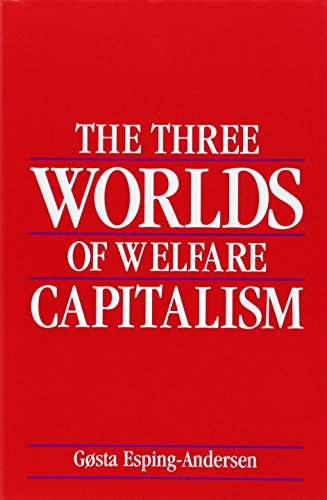The Three Worlds of Welfare Capitalism ebook download
Par swaim larry le jeudi, septembre 22 2016, 03:20 - Lien permanent
The Three Worlds of Welfare Capitalism by Gosta Esping-Andersen


The Three Worlds of Welfare Capitalism Gosta Esping-Andersen ebook
Publisher: Princeton University Press
ISBN: 0691028575, 9780691028576
Format: djvu
Page: 256
Gøsta Esping-Andersen presents the theoretical aspects of Esping Anderson's study of welfare regimes to the modern condition. Esping-Andersen - The Three Worlds of Welfare Capitalism 1990. Available from: http://www.dh.gov.uk/en/Publicationsandstatistics/Publications/PublicationsPolicyAndGuidance/DH_117353 [Accessed 13 December 2010]. Princeton University Press, Princeton; 1990. Princeton, New Jersey: Princeton University Press. The analysis of taxation and public finance, investigated the crisis of the tax State. Historically, the creation of income tax in European countries has had a function of tax redistribution in relation to the creation of Welfare State, as a complementary answer to the social issue of industrial capitalism. The Three Worlds of Welfare Capitalism. As distinguished from the social-democratic and liberal versions (cf. Family Business: Theory and Practice Volume 15/3. They lean to the sociopolitical side .. Esping-Andersen G: The Three Worlds of Welfare Capitalism. It work makes a typology of social regimes in Europe. To study the welfare state is to understand a novel phenomenon in the history of capitalist societies. Achieving Work-Life Balance Volume 14/3. Esping-Andersen, The Three Worlds of Welfare Capitalism, 1990). The main author I will use is Esping-Andersen, who wrote a famous and very quoted book called The Three Worlds of Welfare Capitalism11. Download The Three Worlds of Welfare Capitalism PDF Ebook. Whether or not and to what extent elites could roll back welfare provisions depended, according to Esping-Anderson, on the strength of political class coalitions. State institutions are now preoccupied with the production and distribution of social well-being. Re-conceiving the Artful in Management Summary | Contents. 3After the First World War, Goldscheid (1917) and Schumpeter (1918), two Austrian founders of fiscal sociology, i.e.